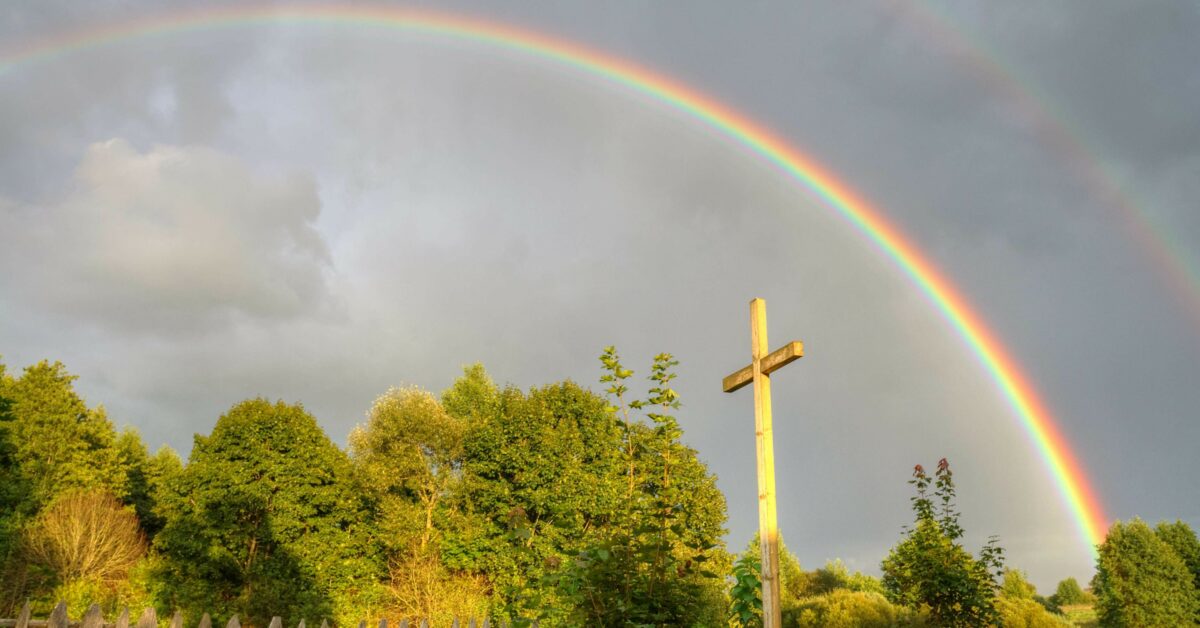We Left Christianity But It Didn't Leave Us: Being Ex-Christian in Relationships
If you still feel controlled by the church you thought you left behind, you're not alone

I curled into a fetal position and sobbed. All my partner had asked for was to reschedule our plans so they could have some alone time. What was wrong with me? Why did such an innocuous request send me to the floor, the night ruined, too anxious and wrecked to enjoy the alone time I also needed?
I didn’t understand it in the moment, but later I realized what was behind my tears: fear that with any space from me, Quinn would realize my inherent badness — the badness Christianity taught me was my core — and leave me.
Many people assume that you can just leave Christianity and be done with it, but that’s not how it works for many of us. Ingrained rules, ideas and norms often don’t disappear overnight. They can continue to show up in our lives, especially within our most intimate relationships.
That’s an inherently shame-based fear, something that Jeremy Lehmann, associate director and practitioner at the Center for Trauma Resolution and Recovery, sees as one of the big things that affects our relationships as queer, ex-Christian adults. “Shame is a belief that I'm not worthy to be in connection because of this fundamental flaw,” he explains. “We have to restore belief in our inherent goodness to be able to have the kinds of relationships we want to have.”
Hannah P., who left the church five years ago and asked to remain anonymous, regularly experienced that shaming. “I remember our pastor saying to the entire congregation, ‘You are a degenerate.’ That’s stuck with me, the idea that we’re inherently evil and nothing without the grace of God.” It sometimes comes up for them in not feeling good enough for their wife.
Sexual shame was another holdover from Christianity Hannah experienced creeping into their relationship. Early on, it felt really hard to receive as a sexual partner. What’s been helpful is feeling like they can trust their wife wholeheartedly and tell her anything that’s happening in their brain.
Milla Lubis, a therapist at The Expansive Group, backs up the idea that our relationships can be healing ground. “Rarely are you going to heal relational wounds in isolation,” they say.
For Jamie B., who requested anonymity, non-monogamy and kink have been a big part of the queer ex-Christian journey. They knew that married, heterosexual monogamy never quite fit them, but then again, nothing about the church ever did, either.
“There was no selfhood that was not sinful. To think or to question, ‘Does this actually work for me?’ would have required me to center myself as the prime directive of my own life, and that was beyond me to imagine at the time,” Jamie explains.
The church taught them love needed to be forced into one shape: marriage. In their first relationship at 25, it took a lot of heartache to realize they couldn’t contain something that alive. They eventually realized they didn’t actually want to make anyone conform to anything.
“If we both chose monogamy, sure. But it had to be a free choice. The default of church life was coercion. It took a long time to not unconsciously play out the same coercive dynamics that were normal to me my whole life,” Jamie says. They were taught the opposite of consent — not just sexually, but in pressuring non-believers to say yes to Christianity. “That constant coerced yes to the church eroded my ability to say no.” It’s been critical for them to reclaim their no and to have their no invited in relationships.
Figuring out who we are and how we want our relationships to be is part of the process for many ex-Christian queer folks, especially those who come out later in life like Lehmann. “There was this whole person that I didn't know yet and I had to figure out what was important to me. What are my values? How do I even know what a well-lived life looks like when I've been told that who I am isn't a valid way to be a human being? What do I want in my relationships?” he says. “We got a lot of practice being who other people need us to be.”
Some of Lehmann’s clients have experienced traumatic events known as adverse religious experiences, and for others the trauma is in neglect, in the ways we don’t learn how to develop as relational beings connected to our emotions and sexuality. “Those are the kinds of experiences that can result in lasting impacts in our physiology, emotional lives, and relationships with ourselves,” he says.
Lubis does somatic work with clients to help them figure out what beliefs and ideas are coming from themselves versus something outside of them like the church or a parent, and how that feels in their bodies.
Communal spaces can also be helpful, Lubis points out. They co-host a queer divinity space with folks of various religious backgrounds who are all looking for a space to embrace queer spirituality. “It’s been incredibly healing and provides evidence that our trauma does not have to be dealt with in isolation.”
The relational piece is key because healing the negative impacts of religion isn’t just about undoing faulty thinking. “You need to have reparative experiences where the feared situation doesn't happen,” Lubis says. “If you're constantly having an experience that mirrors the past, where you had little control, had to be hypervigilant, had to modify yourself, that’s what you're going to lean on as an adult. But that's not going to help you repair that faulty belief. You need to have different experiences where you’re vulnerably intimate or a little bit bad or a little bit unlovable to believe this is possible.”
That’s been true for me. Letting my partner see the “worst” of me and not losing their love has been deeply healing. Something that’s been healing for Hannah has been realizing that they don’t have to only be with someone who has the same religious background. “I worried they wouldn’t get it,” they admit. “But that puts my identity in my religious past. At the end of the day, I’m not my history. I’m building a whole new life with a new set of beliefs. I get to start over with a partner that comes from a different experience, and we get to build something just as diverse as our relationship.”
Pardon me, but amen to that.










